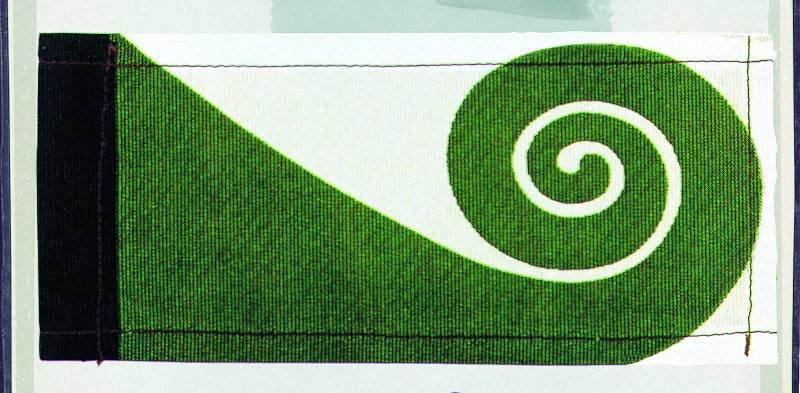Accompanied by a manifesto of March 1983
Hundertwasser presented his Koru flag in parliament, in the media, at various events and via numerous sales channels throughout New Zealand. His flag, which was not intended to replace the official flag of New Zealand, but rather be considered an "indigenous" flag, took many hearts by storm. The issue "A Flag of Our Own" preoccupied the editorial pages of newspapers and magazines, as well as television coverage, it was discussed at schools, and citizens' action groups were formed. Soon, Hundertwasser's Koru flag could be spotted atop the city hall in Auckland, on official buildings in Wellington, on commercial buildings and private residences throughout the country. In 1986 there were more than 1,000 flags. Hundertwasser's Koru flag is popular in New Zealand and is available and used in a number of sizes.
- Egon Schiele Museum, Tulln, 2004
- Minoritenkloster, Tulln, 2008
- Christuskirche, Mainz, 2008
- Caixa Cultural Brasília and Salvador, 2009
- Kurhaus Hinterzarten, 2015
- Borchure: Proposal for a Second Flag for New Zealand, n.p., 1983 (manifesto and c)
- P. Restany, Die Macht der Kunst, Hundertwasser - Der Maler-König mit den fünf Häuten, Cologne, 1998, p. 72 (c) and ed. 2018, p. 71 (c)
- A. C. Fürst, Hundertwasser 1928-2000, Catalogue Raisonné, Cologne, 2002, Vol. II, pp. 1054/1055, 1058 (c)
- B. Stieff, Hundertwasser für Kinder, Munich, 2007, p. 79 (c)
- F. Hundertwasser / P. Restany, Hundertwasser, New York, 2008, p. 113 (c)
- R. Fleck, Kunst und Natur, Vienna, 2016, p. 124 (c)
- Art Souvenir - Hundertwasser, In the Colour of His Brush, London, 2016, pp. 73 (c), 92
- KunstHausWien, Vienna, 1999, p. 88 (c)
- Caixa Cultural Brasília and Salvador, 2009 (c)
- Aus dem graphischen Werk AUSDRUCK UND VISION, Galerie-F Edition, Kranenburg, 2010, p. 93 (c)
- KunstHausWien, Vienna, 1999, p. 88 (c)
- Caixa Cultural Brasília and Salvador, 2009 (c)
- Aus dem graphischen Werk AUSDRUCK UND VISION, Galerie-F Edition, Kranenburg, 2010, p. 93 (c)
- KunstHausWien, Vienna, 1999, p. 88 (c)
- Caixa Cultural Brasília and Salvador, 2009 (c)
- Aus dem graphischen Werk AUSDRUCK UND VISION, Galerie-F Edition, Kranenburg, 2010, p. 93 (c)
- KunstHausWien, Vienna, 1999, p. 88 (c)
- Caixa Cultural Brasília and Salvador, 2009 (c)
- Aus dem graphischen Werk AUSDRUCK UND VISION, Galerie-F Edition, Kranenburg, 2010, p. 93 (c)
- M. Weissbach / U. Weissbach, Neuseeland, Munich, 1996, p.59 (flag, b)
- Austria Today, no. 2, 1991, Vienna, English ed. p. 50 (c), German ed. p. 46 (c)
- fvw international, no. 15, July 5, 1996, Hamburg, p.19 (c)
- Art & Antiques, no. 31, October 2008, New York, p. 92 (c)
- badge/pin, Hundertwasser Art Centre, Whangarei, 2021

Hundertwasser's comment on the work
The flag points in two directions, one against the wind and the enemy, which is sharp like a hatchet, the masculine one; and protected by it is one to leeward, with the wind, a feminine one, which is the opposite, opening and unfolding delicately. The flag is conceived as an indigenous flag and is not intended to replace the official ensign of New Zealand. (from: Hundertwasser 1928-2000, Catalogue Raisonné, Vol. 2, Taschen, Cologne, 2002, p. 1055)